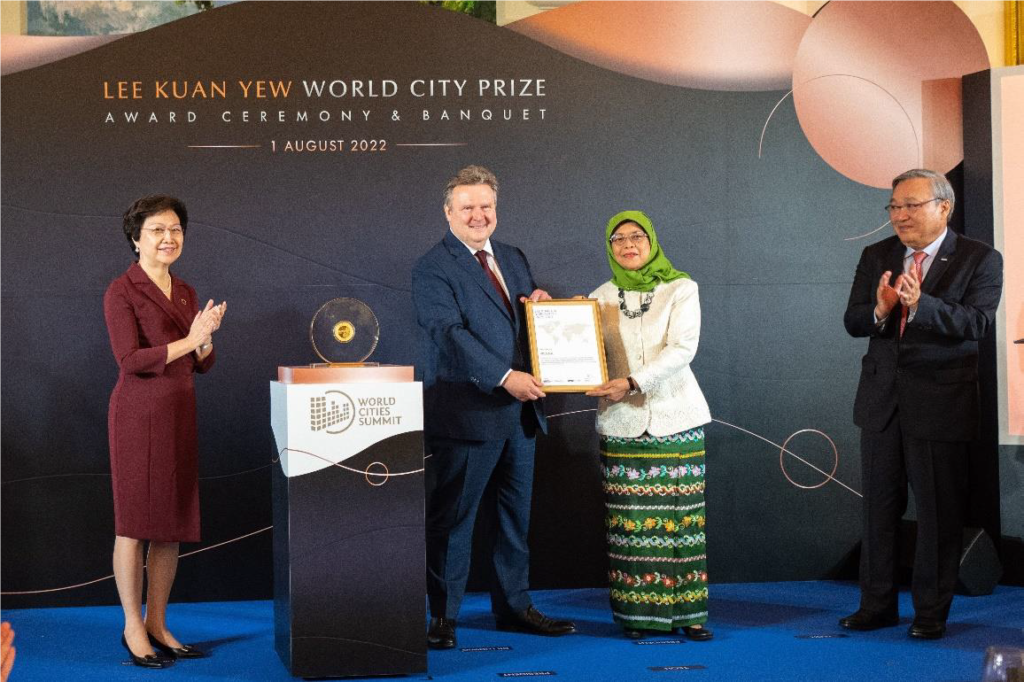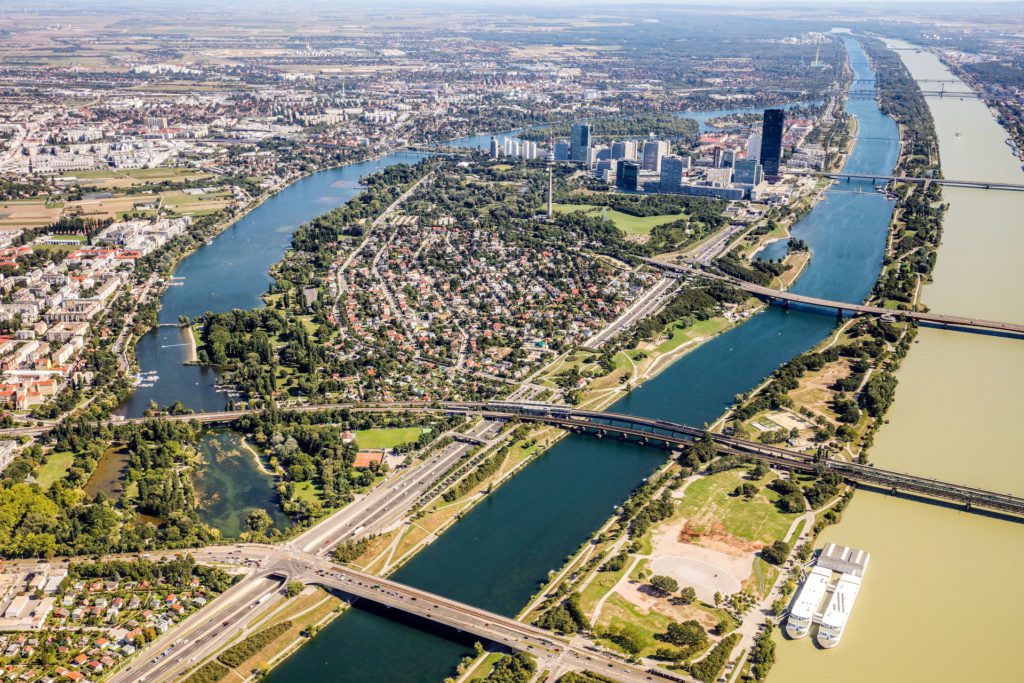Finding common ground at the World Cities Summit 2022
11 AUGUST 2022 – On 1 August, 2022, the Lee Kuan Yew (LKY) World City Prize Lecture and Forum saw the presentations made by representatives of the LKY World City Prize 2020 Laureate, the City of Vienna, and the Special Mention cities of Antwerp, Boston and Lisbon, respectively.

From left to right: Dr Cheong Koon Hean, Chairman of the Lee Kuan Yew World City Prize Nominating Committee; Dr Michael Ludwig, Mayor and Governor of Vienna, Austria; Mdm Halimah Yacob, President of the Republic of Singapore; Mr Danny Teoh, Chairman of Keppel Corporation. Photo courtesy of World Cities Summit
Four cities, 1 common tale?
A “tale of four cities” ensued in the brief panel discussion that followed. Common to all is their emphasis on climate resilience, a people-first approach and turning crises into opportunities, which were reiterated in each city representative’s speech. For example, the mayor of Antwerp Bart De Wever elaborated on seeing opportunities amidst challenges, albeit at higher economic costs; for instance, even though the cost of car parking underground is higher, but if seen in exchange for the benefits of having clean water and green public spaces on the ground level, such challenges could be overcome. Other topics included supply chain disruptions and goods security; food security and growing food in the cities; as well as slow mobility and giving up cars. Unfortunately, the time was cut short for the panellists as the session had to end for lunch, but not before the organisers flashed a video to promote nominations for the LKY World City Prize 2024.
That same evening saw the hosting of the official prize ceremony. The 10th anniversary of the biennial award sees the City of Vienna, Austria, as a role model of responsible environmental stewardship and sustainable urban development.
On 2 August, 2022, in the Future Cities Track that discussed the question of what the future holds for cities, the panellists had a lively discussion about basic needs and realistic capacities.
How to humanise cities?
Professor Lily Kong, President, Singapore Management University, who brought up the point about humanising cities made an impression. She highlighted the unintended consequences of technology at the expense of certain sectors of society. She gave an example of how a garbage truck collector could lose his supplementary income stream from his sideline job (perhaps delivering other items because his primary income was too low) if the garbage collection company insists on formalising the use of smart tech to dictate delivery routes. Does the use of tech here dehumanise the city in a way for these residents?
This oft overlooked aspect of using smart tech in cities could put some informal sectors and workers as well as social groups at a disadvantage, especially when the mandatory use of tech is enforced without considering its human factor impact. When Prof Kong elaborated on how Singapore has used tech to supplement its water needs via desalination, for example, she raised three aspects of solution making: whether it is technologically viable, economically feasible and psychologically acceptable. The last of which is alluded to the humanising factor.
David Wallerstein, Chief eXploration Officer, Tencent, emphasised that technology is only a tool. To foster robust dialogue between city leaders and technologists, he passionately called for cities to be clear about their top priority challenges and then approach technologists for solutions. He also highlighted that ultimately cities have to deal with three basic needs: food, energy and water, before tackling other (higher) ideals (such as inclusiveness, equity, social justice, etc.).
Josef Hargrave, Global Leader of Foresight, Arup, pointed out that there are small- and medium-sized cities with limited capacities that need help—so receptivity to ideas is one thing, but it is quite another to implement them.
Sharing = Multiplying
The Plenary II – Climate Crisis was opened by Indranee Rajah, Minister in the Prime Minister’s Office, Second Minister for Finance and National Development, Singapore with a keynote address. She also announced the launch of two World Cities Summit (WCS) Knowledge Councils on Urban Resilience and Science of Cities by The Centre for Liveable Cities to guide and support future research, as well as the agenda for future editions of WCS. The topic Liveable and Sustainable Cities: Combating the Climate Crisis was put forth for discussion by the panellists.
When asked to sum up the importance of cities collaborating with one another in one sentence, Mayor Aboutaleb quoted: “Sharing = Multiplying”. Contrary to popular belief that sharing means less for each party, sharing will in fact create more benefits for those involved. “Think big, act small” was another quip from the mayor, as he advocates walking the talk and rolling up ones’ sleeves to do the work, in addition to closing the gap between big ideological talk and taking small but meaningful actions.
He also shared Rotterdam’s experience in turning its crisis into opportunity to attract more investments, which in turn created a better living environment for its inhabitants. In this regard, the city invested more resources during the COVID-19 pandemic while it restored affected ecosystems after climate disasters such as floods and droughts.
About the event
The eighth edition of the biennial World Cities Summit (WCS) returned to an in-person conference format this year, from 31 July to 3 August 2022, at the Sands Expo and Convention Centre, Marina Bay Sands. It convened government and industry leaders, and leading experts from around the world to address liveable and sustainable city challenges, share integrated urban solutions and forge new partnerships.
Read more Sustainable Cities stories below:
How Can We Design Cities to Be More Equitable?

The Future of Cities: Sustainability’s Deceptive Dream

Brazil’s Favelas: A model for Green architecture and sustainable living


